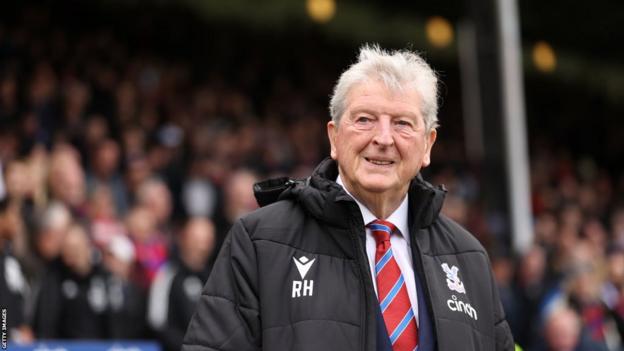
Roy Hodgson’s nomadic 48-year career in management took him around the world but has surely ended at the place he called home – Crystal Palace.
The drug of football that has been Hodgson’s lifelong addiction may well have been sampled for the last time with his departure from Selhurst Park amid fan disaffection and a drop towards the Premier League’s danger zone.
After he stepped down as manager with the club in 16th and, having been taken ill last week, surely it is time for English management’s elder statesman to finally hang up his tracksuit.
If Palace, Hodgson’s boyhood club, is to be the 76-year-old’s final port of call he can look back on a fine body of work, but one that proved he was more suited to clubs of a middling level rather than when his journey took him to the game’s highest places.
Hodgson’s desperate seven-month reign at Liverpool, along with a four-year tenure as England manager that included the rank embarrassment of the 2014 World Cup in Brazil and the Euros in France two years later, are evidence of his limitations.
And yet, for all that, there are many clubs and supporters – particularly Fulham after he took them on a dream trip to the Europa League final in 2010 only to lose to Atletico Madrid in Hamburg – who have every right to offer grateful thanks to Hodgson’s excellent work.
Hodgson would not have lasted so long at the highest levels without vast knowledge, tactical acumen and the ability to achieve results that satisfied many.
And for all the statesmanlike demeanour, Hodgson was not afraid to ditch the avuncular image and become emotional when riled, as the evidence of some spiky interviews proves. You do not achieve what he has done without having an edge.
Hodgson endured ‘miserable time’ at Liverpool
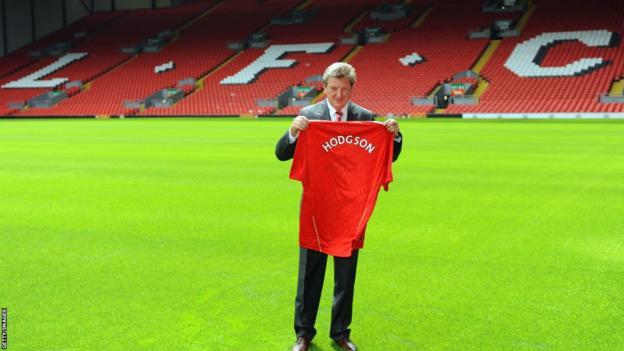
It would be unfair to view Hodgson’s management career purely through the prism of Liverpool and England, but there is no escaping the brutal truth that he was found wanting when presented with his two biggest opportunities in a career which also included taking charge at Italian giants Inter Milan.
Hodgson’s rejuvenation of Fulham, saving them from what looked certain relegation after he arrived in December 2007 before taking them to that Europa League final, not only earned him the League Managers’ Association’s manager of the year award in 2010 but also the Liverpool job that summer.
He succeeded the sacked Rafael Benitez but it was a miserable time as Liverpool were not only in reduced circumstances on the pitch but also in financial crisis under the ownership of Tom Hicks and George Gillett.
The big surprise was that a man of his experience and cosmopolitan career seemed simply unable to grasp what made Liverpool and their supporters tick, the Kop calling for the return of the iconic Kenny Dalglish only weeks into his reign.
Former Liverpool defender Jamie Carragher told this reporter that it was the time Hodgson told his players they needed to have “a bit more of Manchester United” about them that he realised he would never make it at Anfield, the manager’s comments demonstrating a lack of understanding of Liverpool’s DNA and history.
And so it proved as he was sacked in January, the fans’ wishes granted with the return of Dalglish, appointed by Liverpool’s new Boston-based owners.
England job ‘too much when it truly mattered’
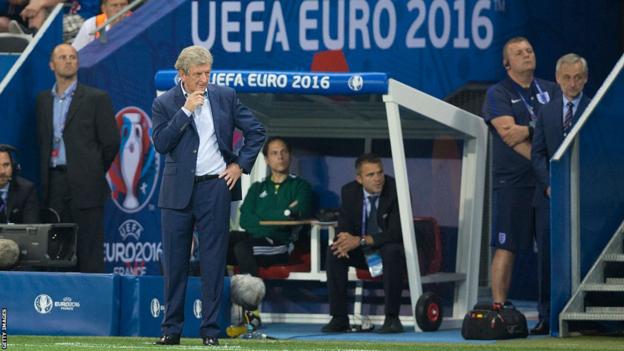
Hodgson went back to what he did best by reinvigorating West Bromwich Albion to such an extent that the Football Association came calling in May 2012 after the surprise parting of ways with Fabio Capello.
He was a “safe hands” appointment (Harry Redknapp was the early favourite), the sort of urbane, multi-lingual diplomat with a football pedigree who fitted the bill perfectly, but the job was too much for Hodgson when it truly mattered.
Euro 2012 was something of a free hit, coming just weeks after his appointment, England going out on penalties to Italy in the quarter-final in Kyiv.
Hodgson’s two other major tournaments were rank embarrassments, not even advancing beyond the group stage in Brazil after defeats by Italy and Uruguay, concluding with a dead rubber against Costa Rica in Belo Horizonte, expectations so low that some of England’s travelling fans even applauded them at the final whistle.
The nadir was the humiliating last-16 exit to Iceland at Euro 2016, England’s 2-1 loss in Nice the biggest embarrassment for the national side since losing to the United States at the 1950 World Cup.
Hodgson delivered his post-match resignation so quickly that not all the media pack were fleet of foot enough to witness it.
He could qualify for tournaments with comfort but came up desperately short when the big results were needed.
If these were the two low points of his long career, then it is only right to point out there were many other places where Hodgson’s time can be considered a success.
Hodgson ‘destined for coaching and management’
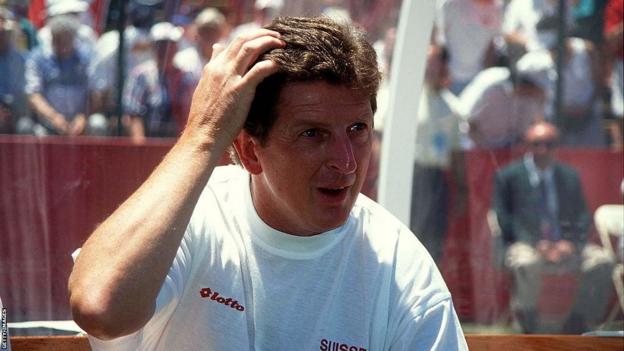
A meticulous worker on the training ground, a determined user of drills to emphasise his methods and strategies, many players will testify to his skills.
Hodgson’s playing career was effectively a non-league affair but the inquiring mind of a man who enjoyed reading the works of Milan Kundera, John Updike and Philip Roth was always destined for coaching and management.
He forged his reputation in Scandinavia, winning the Swedish title at Halmstad in 1976 and 1979, making him a legendary figure at the club. A short stay at Bristol City was undermined by a financial crisis but after spells at Oddevold and Orebro he came to greater prominence at Malmo, leading them to five consecutive titles.
Hodgson continued his work in Switzerland with Neuchatel Xamax, doing well enough to be offered the national team post, subsequently leading them the 1994 World Cup in the United States, where they lost to Spain in the last 16.
He also took the Swiss to Euro 96 in England, his successes bringing him wider attention, taking the post at Inter Milan after qualification was secured.
The zenith of his time in Milan was taking Inter to the 1997 Uefa Cup final, which they surprisingly lost over two legs to Bundesliga side Schalke.
It seemed inevitable Hodgson would eventually be offered a job in England. It came in 1997 when he agreed to join Blackburn Rovers in the summer after Sven-Goran Eriksson backed out of an earlier agreement with owner Jack Walker.
Hodgson settled seamlessly, taking Rovers into sixth place and back into Europe in his first season but his second term was a failure, leaving in November 1998 after a home loss to Southampton saw them rooted to the bottom of the Premier League.
He hit the road again, taking a caretaker post at Inter before winning the title and cup with FC Copenhagen in Denmark. A return to Italy with Udinese did not work out.
There were also spells coaching the United Arab Emirates, Finland and Norwegian club Viking before that outstanding stint at Fulham was the start of his longest period in England.
‘A season too far for Hodgson’
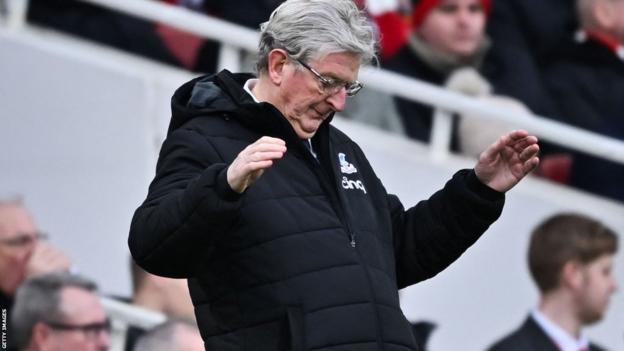
Hodgson will be remembered fondly at Fulham and West Brom and – even though his second spell ended so disappointingly – by plenty at Palace.
He arrived in September 2017 after a short-lived experiment with Frank de Boer which encompassed just five games, steadying the ship in classic Hodgson fashion to guide the Eagles to 11th. Hodgson continued to stabilise Palace, announcing his intention to leave in May 2021 with the club established as a firm Premier League fixture.
Many thought this was the end for Hodgson but he was tempted back by Watford in January 2022 as replacement for another veteran Claudio Ranieri, but was unable to prevent relegation and left.
Hodgson seemed to signal the curtain coming down on his career when he said: “Now that the Watford job has unfortunately ended, I don’t think I shall be putting my name forward any more for further sorties into the world of Premier League football.
“I think I’ve earned the right to step back and enjoy some free time and spend some time with my wife and son.”
And yet the old campaigner could not resist one final crack when he was reappointed by Palace in March 2023 on a short-term deal to replace Patrick Vieira, who had been dismissed.
Hodgson’s team performed so well that Palace were persuaded to offer him a new contract last summer, which he accepted.
It was a season too far for one of the most enduring and respected figures in the game, who will now presumably take that well-earned free time to bask in his lengthy management career.


